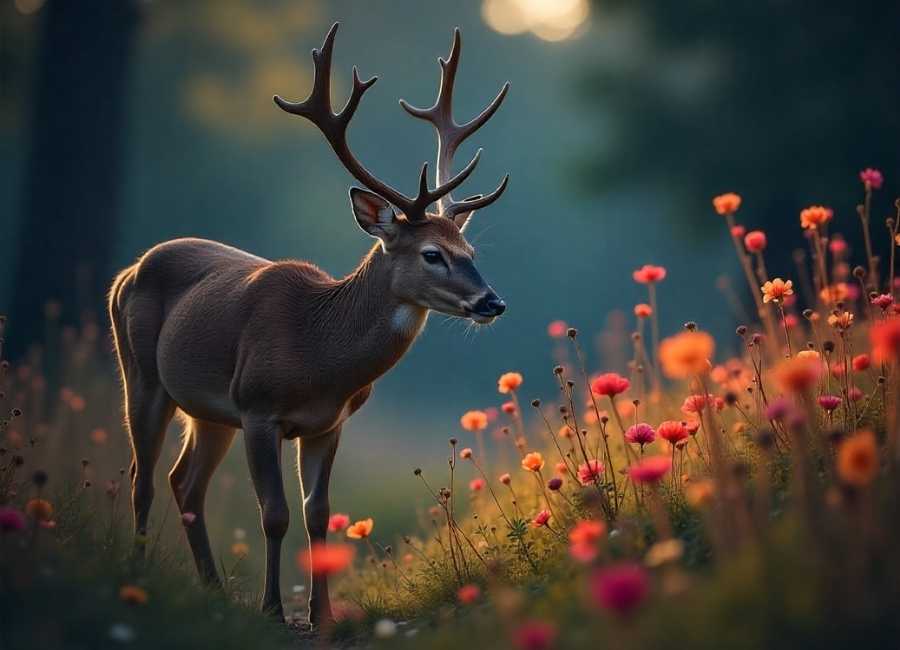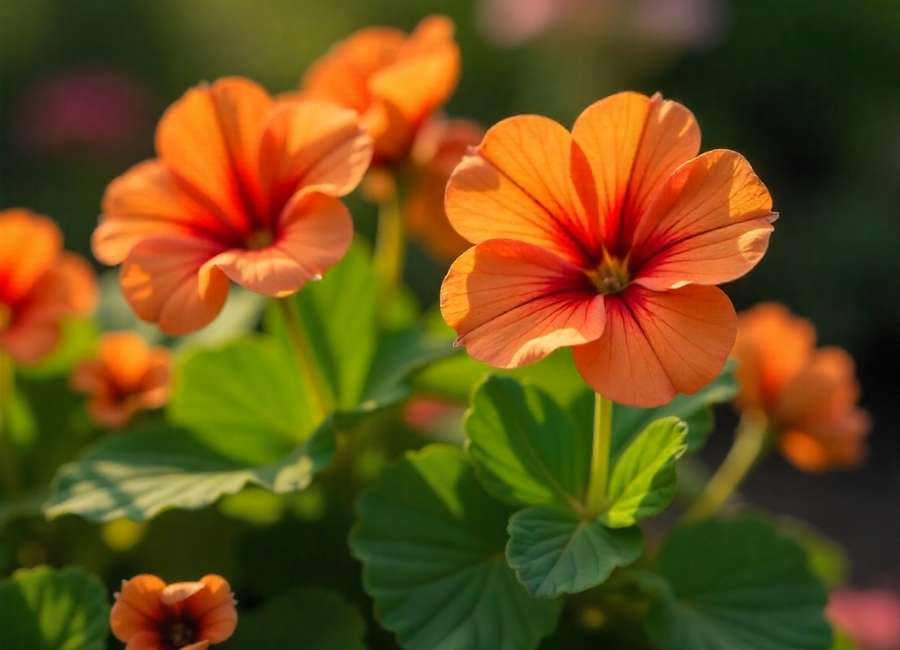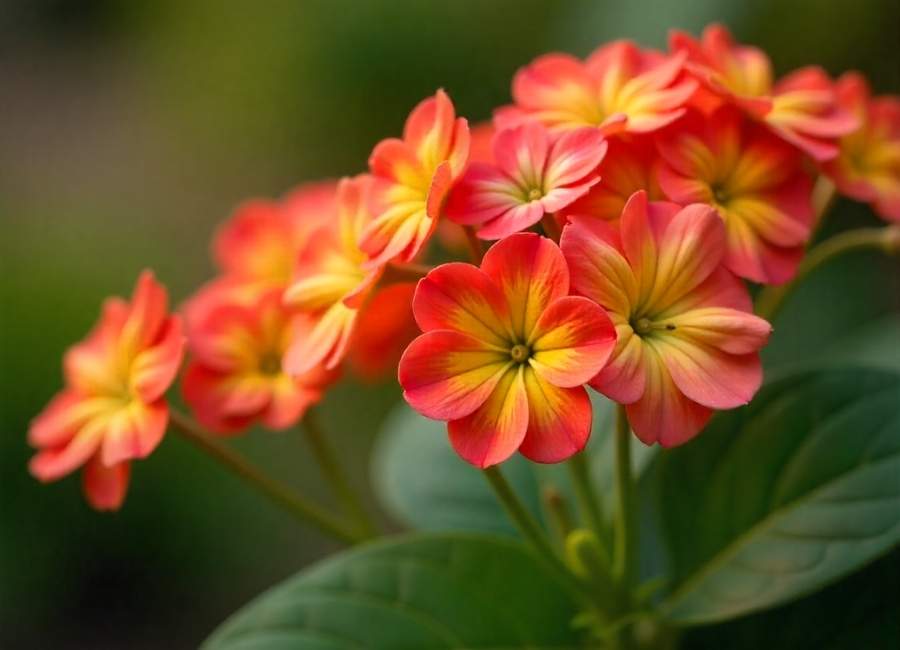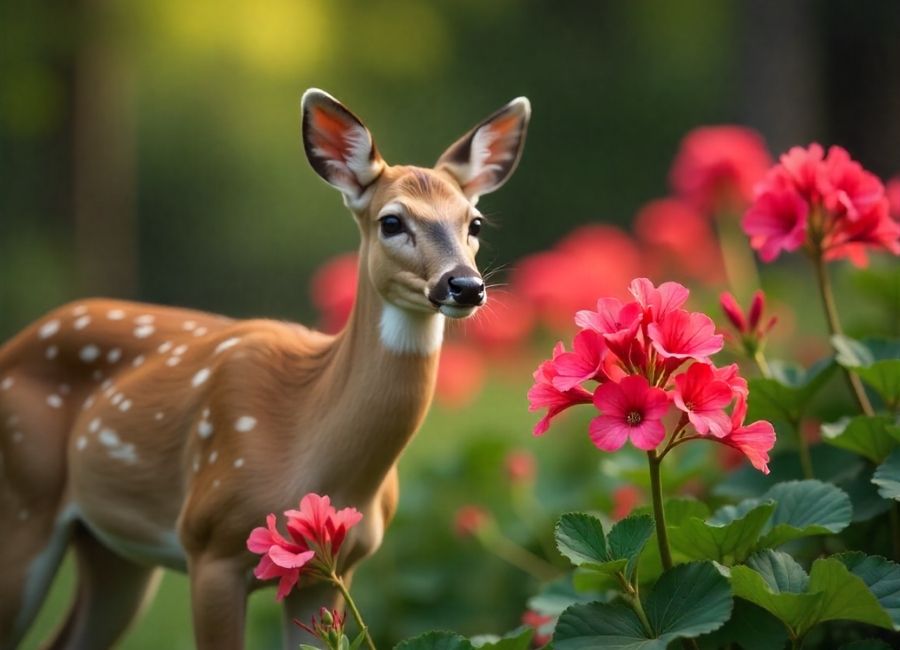Deer are undeniably majestic creatures, but for gardeners, they can quickly become unwelcome visitors. If you’re nurturing a garden full of vibrant geraniums, you may wonder, “Do deer eat geraniums?” This blog will explore whether these beautiful blooms are a snack for deer, which factors influence their feeding behavior, and practical tips to protect your garden. By the end, you’ll have a clear understanding of how to keep your geraniums (and sanity) intact.
Do Deer Eat Geraniums?
The short answer is yes, but not always. Geraniums are often labeled as “deer-resistant” plants, which means deer are less likely to eat them compared to more appealing options like hostas or tulips. However, under certain conditions, deer might give in to dining on your geraniums. Here’s why:
Factors That Influence Deer Eating Habits
- Food Availability

When food is abundant, deer tend to stick to their favorite snacks like clover or corn. But during scarce times, especially in late fall or winter, deer are less picky and may nibble on geraniums.
- Seasonal Changes
Deer behavior changes with seasons. While geraniums may not be attractive in warmer months when fresh greens and flowers are aplenty, they could become an option during harsher winters when food sources are limited.
- Scent and Taste
Many geranium varieties have a strong, slightly bitter scent that discourages deer from eating them. However, younger plants or certain cultivars with milder scents might still tempt hungry deer.
- Pressure from Other Deer
Areas with high deer populations often see more extensive damage to gardens as competition for food grows. Even so-called deer-resistant plants, including geraniums, can fall victim to grazing.
Tips to Protect Your Geraniums From Deer

While geraniums are less likely to be eaten than other plants, it’s always better to take preventive measures if deer frequent your area. Here are a few practical solutions:
1. Use Deer-Resistant Plants Around Geraniums
Planting more unappealing vegetation around your geraniums can act as a natural deterrent. Some great options include:
- Lavender
- Salvia
- Rosemary
- Foxglove
These plants are aromatic or toxic to deer, creating a natural barrier.
2. Apply Deer Repellents
Deer repellents are a popular and effective way to keep deer away from your garden. Look for options specifically designed for flowers and shrubs. Here’s how to make the best use of repellents:
- Spray them around the perimeter of your garden.
- Reapply after heavy rain.
- Rotate repellents frequently to prevent deer from becoming accustomed to the scent.
3. Install Physical Barriers
Fencing is one of the most reliable ways to protect your plants. Here’s how to make it work:
- Opt for tall fences (8 feet or more) since deer are excellent jumpers.
- Use mesh or slatted designs to avoid obstructing your garden’s view.
- If fences aren’t possible, consider temporary barriers like netting.
4. Incorporate Motion Deterrents
Deer are cautious animals and can be scared off with sudden motion or noise. Consider adding:
- Motion-activated sprinklers
- Ultrasonic devices
- Fake predators like owls or scarecrows (move these around to maintain effectiveness)
5. Garden Placement and Maintenance
Where you plant your geraniums can make a big difference. Plant them close to your home or in areas with less deer activity. Additionally:
- Remove overgrown vegetation that could provide hiding spots for deer.
- Keep your garden well-lit at night to deter nighttime grazers.
Are Certain Geranium Varieties More Resistant?

Yes, some geranium varieties are more deer-resistant than others. For example:
- Hardy (Perennial) Geraniums are often more deer-resistant due to their pungent smell and harder foliage.
- Pelargoniums (Annual Geraniums), though beautiful, may be slightly more vulnerable because they have softer, more succulent leaves.
Why Deer Resistance Isn’t a Guarantee
It’s critical to remember that no plant can be guaranteed 100% deer-proof. Deer are adaptive creatures, and severe hunger can override their natural taste preferences. Even the most resistant plants can become appealing when other food sources are unavailable.
Other Wildlife and Geraniums
While you may be focusing on deer, keep in mind that other wildlife could find your geraniums tempting. This includes:
- Rabbits: They are smaller but equally destructive to gardens.
- Groundhogs: Known to feed on various plants, including flowers and foliage.
- Slugs and Snails: These pests aren’t mammals like deer but might still wreak havoc on your plants.
Finding Balance in a Wildlife-Friendly Garden
If you’re passionate about gardening and respectful of wildlife, consider creating a wildlife-friendly garden that balances your needs with theirs. Incorporate plants that deer love in a safe area far from your garden and include native vegetation to support biodiversity. This approach can potentially redirect deer attention away from geraniums.
Protecting Your Garden Long Term
Maintaining a deer-resistant garden is an ongoing process. Here are a few long-term tips to ensure your flowers and plants thrive:
- Rotate your plants annually to keep deer from adapting to your setup.
- Continue investing in deer-resistant and companion plants.
- Monitor local deer activity in your area and adapt your strategies accordingly.
Keep Your Geraniums Safe and Thriving
Geraniums may not be a top choice for deer, but they aren’t entirely safe from their munching. By understanding deer behavior and implementing protective measures, you can enjoy flourishing geraniums without constant worry.
Want more tips to keep your garden beautiful and protected? Bookmark our blog for gardening advice, and share your own deer-proofing successes with our gardening community!















